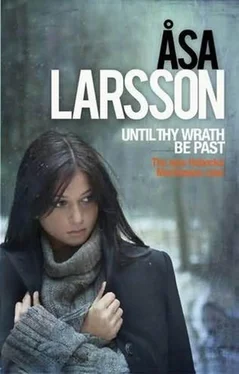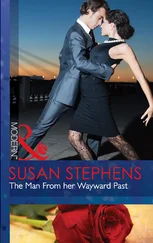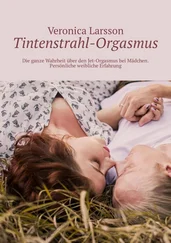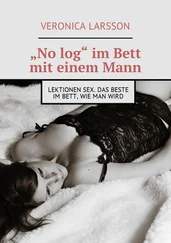Krekula is eighty-five years old. Lying on his back in the little room, he says to himself – as he has been saying to himself ever since – I couldn’t have stopped her.
He shouts for her again. Says he is thirsty. That he is still freezing.
She appears in the doorway with a glass of water in her hand. When he turns to look at her, she empties the glass in a single swig.
“You’ve always revolted me,” she says. “You know that, don’t you?”
Even as she is saying it, the doorbell rings. The police are outside. That little fair-haired inspector Anna-Maria Mella. With two men standing at the bottom of the steps. Mella asks if Tore is in.
Kerttu Krekula realizes that this is serious. The police say nothing about a warrant. Nor do they need to. Kerttu is furious. Absolutely furious.
“Are you mad?” she yells. “Out of your minds? Why are you harassing us? What do you want him for?”
And she stands there screaming as if someone had stuck a stake through her body while the police enter the house and take a look around.
“My boy,” she screams. “My poor boy!”
And when the police have left, she slumps down at the kitchen table with her forehead resting on one arm. She puts her other arm over the top of her head.
Isak Krekula is lying in the little room, shouting. Who the devil was that, he wants to know. Who was it? She does not answer.

I’ve landed on all fours on Kerttu’s draining board. Standing like a cat on the palms of my hands and the soles of my feet. I want to see this. Bloody Kerttu! There’s only the two of us in the kitchen. I accompany her to the open-air dance floor at Gültzauudden just outside Luleå. It’s 28 August, 1943.
There is a dance at Gültzauudden near Luleå. The Swingers are playing. “Sun Shines Brightly on Your Little Cottage”, “With You in My Arms”, “Ain’t Misbehavin’” and other popular songs. The mosquitoes and horseflies join in the “Sjösala Waltz”, and the telephone wires sag under the weight of the swallows, sitting in a row as if at the front of the stalls.
The young men are wearing suits finished with French seams. The girls are in home-sewn outfits with stiffened bell skirts. Everyone is slim and willowy in these straitened times of food rationing.
Kerttu is not in a particularly good mood. She has come to the dance without a partner. And Schörner would not let her wear her best dress either.
“You mustn’t stand out too much,” he said. “You must look like an ordinary young lass. You come from… wherever it is you come from.”
“Piilijärvi,” she said.
“But you don’t have a fiancé, of course, and you’re staying with your cousin here in Luleå, and you’re looking for a job.”
She buys a bottle of soda and stands around at the edge of the dance floor. Two young lads come up and ask her for a dance, but she says, in a friendly way, “Maybe later,” explaining that she is waiting for her cousin. Drinking her soda slowly to make it last, she feels like a cross between a wallflower and an ice queen. Out of the corner of her eye she sees the man Schörner is trying to trap. Schörner had shown Kerttu a photograph of the lad. Axel Viebke.
Here comes Schörner. He has borrowed the depot manager’s Auto-Union Wanderer. Young boys hanging around the dance floor and sitting in the birch trees like a flock of thrushes gather round the smart-looking sports car.
Schörner, who has a quick eye for the leader of any flock, gives one boy a five-krona note to keep an eye on the car. He does not want it scratched. Or to find that some joker has dropped a sugar cube in the petrol tank.
Then he saunters over to the dance floor. He is in uniform. Those near him stiffen noticeably.
He buys a soda, but hardly touches it. Then he walks over to Kerttu and asks her for a dance.
“No thank you,” she says in a loud voice. “I don’t dance with Germans.”
Schörner’s face turns white and strained. Then he clicks his heels, marches over to the car and drives off.
Kerttu turns to look at Viebke. Stares hard at him. Gazes into his eyes. Then looks down. Then gazes back into his eyes.
He leaves his group of friends and walks over to her.
“Do you dance with boys from Vuollerim, then?” he says. She laughs, flashing her white teeth, and says yes, of course she does.
While they are dancing she tells him how she has moved to her cousin’s in Luleå while she looks for a job. Her cousin seems to have forgotten that they were going to meet at the dance and has not turned up. But that doesn’t matter as Viebke and Kerttu dance together all evening.
When the dance is over, he wants to walk her home. She says he can come part of the way. They go down to the riverbank. The leaves on the weeping birches will soon be turning yellow; it will not be long before summer is over. That is both sad and romantic.
Viebke says he admires the way she snubbed the German soldier who asked her for a dance. Who did he think he was, rolling up like that in his posh car!
“I hate the Germans,” she says.
She falls silent and gazes out over the river.
Viebke offers her a penny for her thoughts. She wonders if he has heard that three Danish prisoners of war have escaped from a ship in the harbour.
“I hope they’ll be alright,” she says. “Where will be safe for them?”
Viebke looks at her. She feels as if she is in a film. Like Ingrid Bergman.
“They’ll be alright,” he says, stroking her cheek.
“How can you be so sure?” she says with a smile.
And the smile has a trace of condescension in it. As if she thinks he is just a young lad at a dance who could not possibly know anything at all. Although in fact she is much younger than he is.
“I know,” he says. “Because I’m the one who’s hidden them.”
She bursts out laughing.
“You’d say anything to get yourself a kiss.”
“You can think whatever you like,” he says. “But it’s a fact.”
“Then I’d like to meet them,” Kerttu says.
Two days later she is sitting in Zindel’s Auto-Union Wanderer beside Sicherheitschef Schörner. Two German soldiers are in the back seat. Their rifles are lying on the floor.
It is a lovely late summer’s day. Haystacks stand in rows in the fields, and the scent of sun-warmed hay is lovely. In the meadows where the hay has been harvested, cows are grazing on the last of the late-summer grass. The car has to keep slowing down because farmers are out on the roads with their horses and carts. The rowan trees are laden with clumps of bright red berries. A father and his three daughters are on the way home from berry-picking in the woods. You can see from the way he is walking that the birch-bark rucksack on his back is heavy with fruit. The girls have small enamel buckets full of blueberries.
Kerttu and the Germans walk the last part of the way. The path runs through the forest and alongside some swampy meadows. Eventually they come to Viebke’s uncle’s hut, used by farm hands as a base at haymaking time. It is small and unpainted, but in the sunshine that day everything is beautiful. The hut gleams like silver in the middle of the clearing.
Schörner orders the others to keep quiet as he draws his pistol and approaches the hut.
It is only when he does this that Kerttu becomes vaguely aware that Viebke will feel that she has betrayed him. That had not occurred to her before. It had all been a sort of adventure.
Schörner and the other soldiers walk cautiously towards the hut. They go inside. After a short while they come out again.
“There’s nobody here,” Schörner says disapprovingly.
He looks accusingly at Kerttu.
Читать дальше













